
Dental Implants – Jonesboro, AR
A State-of-the-Art Solution for Tooth Loss
Missing teeth can impact just about every facet of your life, but they don’t have to! If you’re tired of dealing with unsightly gaps, a limited diet, or unstable dentures, there is a solution available: dental implants in Jonesboro. With them, Dr. Shane Smith can restore your bite, bring back your smile, and renew your confidence and oral health at the same time. You can get started by calling or scheduling an in-person consultation today to discuss your options for tooth replacement with dental implants in Jonesboror, AR.
Why Choose Shane Smith DDS for Dental Implants?
- Locally Owned & Operated Dental Office
- Implants Placed & Restored in the Same Location
- CT Scanner Technology Guarantees Great Results
What are Dental Implants?
A dental implant is actually not a prosthetic tooth, but rather a titanium post that is used to mimic a tooth root. It is placed into the jawbone where it undergoes a process called osseointegration, in which it bonds to the bone. At this point, a crown, bridge, or denture can be placed on top, with the implant serving as a strong and steady foundation.
The 4-Step Dental Implant Process

Getting dental implants typically requires multiple appointments spread out over several months. We’re able to complete the entire dental implant process in-house thanks to Dr. Smith’s advanced training. During your initial consultation, we’ll give you a timeline and explain what you can expect. Generally speaking, the implant process can be broken into four major steps: consultation, surgery, osseointegration, and delivery of the final restoration.
Initial Dental Implant Consultation
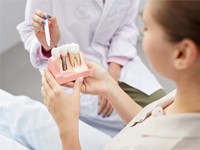
During your initial consultation, we’ll need to examine your mouth in order to answer an important question: “Are you a candidate for dental implants?” We may find that certain preliminary procedures are needed before implants can be placed; for example, bone grafting might be required to ensure that there’s enough bone density in your jaw to support the implant posts. Once we’re sure that implants are viable in your case, we can start planning the rest of the process.
Dental Implant Surgery
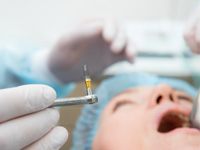
On the day of your dental implant surgery, your mouth will be numbed with a local anesthetic. We’ll then open your gums so that we can work with your jawbone. A specific number of implant posts will be carefully placed in the jaw at pre-determined locations and angles. Once we’ve sutured your gums shut, a special cap is placed on each implant post in order to keep them safe during the implant process.
Dental Implant Osseointegration & Abutment
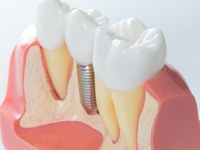
The success of your dental implants heavily relies on a natural process called osseointegration. Simply put, this is when the implant posts fuse with your jaw, essentially becoming part of your body as a result. Without osseointegration, your implants wouldn’t be able to fulfill the functions of natural tooth roots, and they would eventually come loose.
Osseointegration generally takes about three to six months. We’ll give you instructions for taking care of your mouth during this time. When osseointegration is complete, you’ll be ready to undergo a second surgery in order to have abutments attached to each implant post. The abutments are what will hold your new crown, bridge, or denture in place once it’s ready.
Delivery of Dental Implant Restoration(s)
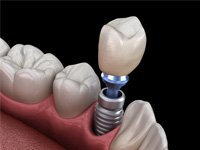
Your final restoration will be carefully designed based on an impression of your smile. At a separate dental lab, trained ceramists will customize your restoration so that it fits properly in your mouth and looks as natural as possible. Once we’ve received your crown, bridge, or denture, we’ll schedule one last appointment for you.
We’ll attach the final restoration to your abutments, then perform a last-minute check to see if any adjustments need to be made. By the end of your appointment, your new smile will be complete, and you’ll be ready to use it to enjoy all your favorite foods, speak clearly at important events, and make a dazzling first impression whenever you meet someone for the first time.
Benefits of Dental Implants

Getting dental implants typically requires multiple appointments spread out over several months. We’re able to complete the entire dental implant process in-house thanks to Dr. Smith’s advanced training. During your initial consultation, we’ll give you a timeline and explain what you can expect. Generally speaking, the implant process can be broken into four major steps: consultation, surgery, osseointegration, and delivery of the final restoration.
Day-to-Day Benefits

- Simple maintenance: Instead of needing special cleaning products and tools for your restorations, you’ll simply need to brush, floss, rinse, and get routine dental checkups to maintain your dental implants like with your natural teeth.
- Enjoy all your favorite meals: Since dental implants give you 80% or more of your natural biting power, you can feel free to munch on all kinds of foods, such as steaks, nuts, and apples, without worrying about them shifting out of place.
- Mor youthful facial shape: Dental implants serve as your new tooth roots, which help to stimulate the jawbone and surrounding tissues to remain strong and young looking.
- Increased confidence: Not only will you feel much better about showing off your pearly whites, but you also won’t need to worry about your restorations accidentally popping out at inconvenient times. You’ll be able to eat, talk, and laugh completely confident in your results.
Health Benefits

- No relying on your nearby teeth: Traditional restorations like bridges and partial dentures generally depend on the healthy natural teeth on either side of the gap to support them. This, however, can put them at risk of issues like decay, wear-and-tear, or even extractions later on. Dental implants are self-sufficient, meaning they can help preserve your other teeth in the process.
- Prevent jawbone deterioration: Whenever you have missing teeth, the lack of stimulation of blood flow can cause your jawbone to deteriorate or shrink over time. Since dental implants serve as your new roots, they’ll help promote healthy circulation in your bone tissues, promoting a stronger and healthier facial structure in the long run.
Long-Term Benefits

- High success rate: Generally speaking, 95% of dental implants are still successful even 10 years after being placed.
- Save thousands of dollars: While this treatment may have a higher upfront cost than traditional restorations, they can actually save you more money. This is because you won’t have to worry about needing to adjust or replace your new teeth every few years, which can become costly in the long term.
- Long-lasting solution: Although dental bridges and dentures will need to be replaced after several years, dental implants can last anywhere between several decades to a lifetime!
Who Can Dental Implants Help?

If you have any number of missing teeth, then dental implants may be a viable solution. Decent oral health and a thick enough jawbone are required to undergo the treatment, and Dr. Smith can help a patient become a qualified candidate if they aren’t one already. The procedure can be tailored to meet any patient’s needs:
Missing Single Tooth
Without disturbing the teeth on either side, an implant can be positioned in the mouth and topped with a custom-made crown. The crown itself will be color-matched and shaped so that it blends right in with the smile.
Missing Multiple Teeth
Multiple single implants can be placed anywhere in the mouth, and two can be used to support a dental bridge as well. Compared to regular bridges, implant bridges look better, last longer, and offer more stability.
Missing All Teeth
An implant denture can be anchored to the jawbone with as few as 6-8 implants. We can create a brand-new prosthetic or retrofit existing dentures to fit over implants. Either way, the teeth will be rock-solid and offer much more bite strength compared to a regular prosthetic.
Learn More About Implant Dentures
Learn More About All-On-4 Dental Implants
Dental Implants Post-Op Instructions

The few days after your dental implant surgery are crucial to the long-term success of your new teeth. Fortunately, as long as you take a few simple precautions and follow Dr. Smith’s guidelines to a tee, you can look forward to a smooth and speedy recovery. Your implants will also be more likely to stand the test of time. Ahead of your surgery, our team will provide you with dental implant post-op instructions in Jonesboro. While the details may vary, you can use the tips below as a basic reference.
What to Do Directly After Dental Implant Surgery

For the first 48 hours after getting dental implants, you’ll need to take it easy and let your body focus on healing. Strenuous physical activity could make it difficult for your mouth to recover, so avoid exercise during this period. Make sure to get plenty of sleep and take any medications we’ve prescribed as directed. Drink plenty of water, but do NOT use a straw; it could dislodge the blood clot forming over the implant site, leading to a painful condition called dry socket.
Common Side Effects

Mild soreness, sensitivity, and general discomfort in your mouth are all normal following dental implant surgery, and you can manage them by taking prescribed or over-the-counter pain relievers as we’ve instructed. Applying a cold compress to the outside of your cheek (for no longer than 15 minutes at a time) can reduce discomfort and swelling, another common side effect. For the rest of the day after your procedure, you’ll most likely experience light bleeding from the implant site. We’ll let you know how (and how often) to change the gauze pads over the site to slow the blood flow.
Diet

Until your mouth has fully healed, you’ll want to follow a soft food diet. After a few days have passed, you can gradually integrate heartier foods into your diet when you feel comfortable doing so. Before your dental implant surgery, we recommend stocking up on foods like:
- Mashed potatoes
- Plain yogurt
- Gelatin
- Ice cream
- Pudding
- Soft-cooked pasta, like mac and cheese
- Applesauce
To make sure your body is adequately nourished as you heal, eat foods that are high in protein. Also, stay away from hot, spicy, or crunchy foods, as they can irritate the implant site.
Oral Hygiene

Keeping your mouth clean is essential in preventing infections. After your surgery, you should be able to brush and floss as normal, but avoid getting too close to the area where the implants were placed. If we prescribed an oral rinse, use it according to our guidelines. If not, you can use a store-bought mouthwash as long as it doesn’t contain alcohol. Whatever the case may be, don’t spit too forcefully after rinsing since it could cause dry socket.
What to Do After Your New Teeth Are Attached

Most patients are fully healed within a week of their dental implant placement. However, you’ll need to wait up to six months for your implants to finish integrating with your jawbone. Once that process is done, we can secure your dental crown, bridge, or denture, onto your implants, and voila! Your new smile is complete! After we place these restorations, your gums might feel slightly sensitive, but this should only be temporary and easily managed with over-the-counter pain medications.
Understanding the Cost of Dental Implants

The price of dental implants is different depending on each case. This is because everyone has their own needs when it comes to replacing teeth. Some people may just need a single tooth replaced while others might need to replace an entire arch. Ultimately, Dr. Smith is here to cater to your needs and create a plan that will work best for you. Here are a few things that you should think about ahead of time when considering the overall cost of your treatment.
Preliminary Treatments & Dental Implant Surgery
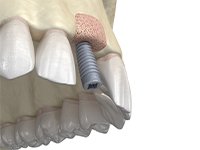
Some people need to have treatments and procedures before they are able to have their dental implants placed. This includes treatments like gum disease therapy, tooth extractions, and bone grafts. These will add to the overall cost of the procedure but will help to ensure the success of your dental implants in the long run. Fortunately, these procedures are often partially covered by dental insurance. The cost of your surgery will be affected by the location of the surgical site and type of sedation you opt for as well for the most comfortable treatment possible.
The Parts of Your Dental Implant
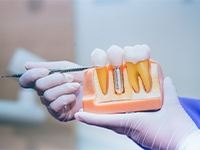
Here are a few of the different factors that contribute to the cost of your implant:
- Number of dental implants: For a single tooth, you will most likely require just one dental implant. However, if you are missing several teeth in a row or an entire arch, you will need more for optimal support.
- Type of restoration: Crowns, bridges, or dentures, all have different costs. Generally, the smaller the restoration, the lower the cost will be.
- Material: Implants can be made from a couple different materials, like zirconia and titanium. This will affect the overall cost.
How Dental Implants Can Save You Money

It isn’t uncommon for patients to be tempted to choose dentures or a dental bridge because of their low initial cost, but the truth is that you may save more in the long run by opting for dental implants. You won’t need to worry about paying for replacements and repairs every 5 to 10 years, and you don’t need to add adhesives or soaking solutions to the shopping list. Implants will also help to prevent oral health issues like periodontal disease, tooth decay, and bone loss, ultimately preventing you from needing pricy treatments later on. By replacing your teeth with dental implants, you can save your oral health and wallet in the future.
Does My Dental Insurance Cover Dental Implants?

Most dental insurance plans don’t cover dental implants, but there are some exceptions. Part of the final restoration and preliminary treatments are often covered. Talk to our dental team so we can look over your benefits and help you fully maximize them. Restoring the health and function of your smile shouldn’t mean stressing over finances.
Making Dental Implants Affordable?

To help make dental care for accessible to patients, we offer additional financing through CareCredit. This trusted, third-party financer offers flexible monthly payment plans with little-to-no interest. This way, the cost of your treatment can be split into manageable, monthly payments.
To learn more about how much your dental implants will cost, give us a call to schedule a consultation. We’re looking forward to helping you get your smile back for good!
Dental Implant Technology
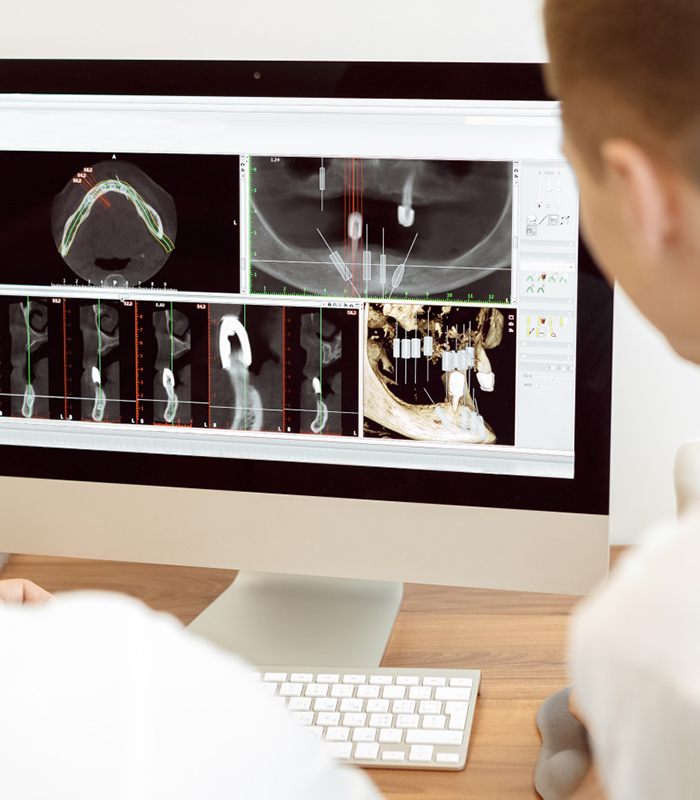
Dr. Shane Smith has completed extensive training in dental implants. His skill and education make him fully prepared to help people enjoy this state-of-the-art form of tooth replacement. However, he could not do what he does without the aid of dental implant technology. The advanced instruments in our office contribute to precise, efficient, and successful treatment. Would you like to learn more about some of the technology that could play a role in rebuilding your lost teeth? Continue reading below.
CBCT Scanner
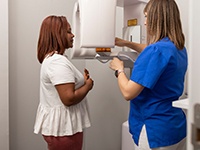
A cone beam computed tomography scanner, also called a CBCT scanner or cone beam scanner, is an advanced piece of imaging equipment. It uses the same type of radiation as a regular digital X-ray. However, it emits the radiation in a cone-shaped beam. This unique function allows it to capture extremely detailed, three-dimensional images of a patient’s oral structures. For example, not only does it show us the structure of the jawbone, but it can also allow us to see where the nerves and connective tissues are.
The CBCT Scanner’s Role in Dental Implant Treatment
Our CBCT scanner can play an important role at various stages of the dental implant treatment process:
- Before dental implant placement: If you are interested in getting dental implants, we may scan your mouth in order to determine if your jawbone is thick enough and strong enough to support your new prosthetic tooth roots. The scan will also allow Dr. Smith to precisely plan where, at what angle, and at what depth he will insert the implants. This precise preparation can minimize the risk of human error during the implant surgery.
- After dental implant placement: After your implants are in place, we may use our CBCT scanner to monitor your osseointegration (the process of your implants bonding with our jawbone).
- If problems occur: Rarely, patients run into problems with their dental implants. Our CBCT scanner can be used to identify the nature of the problem so we can recommend a treatment plan.
What to Expect During Your Scan
The scanning process with our CBCT machine is quick and painless. First, we may ask you to remove any jewelry that might show up on your results. Next, we will position you in the machine. You should stay as still as possible while it captures images of your oral structures. Usually, scans take less than one minute.
There is no need to worry about excessive radiation exposure. Although the CBCT machine emits more radiation than a regular X-ray, it still uses much less than a typical CT machine that you would find in a hospital.
After the scan is complete, we will have immediate access to the images in our computer system. Once Dr. Smith has a chance to examine your results, he will inform you of his findings.
Advanced Dental Implant Procedures
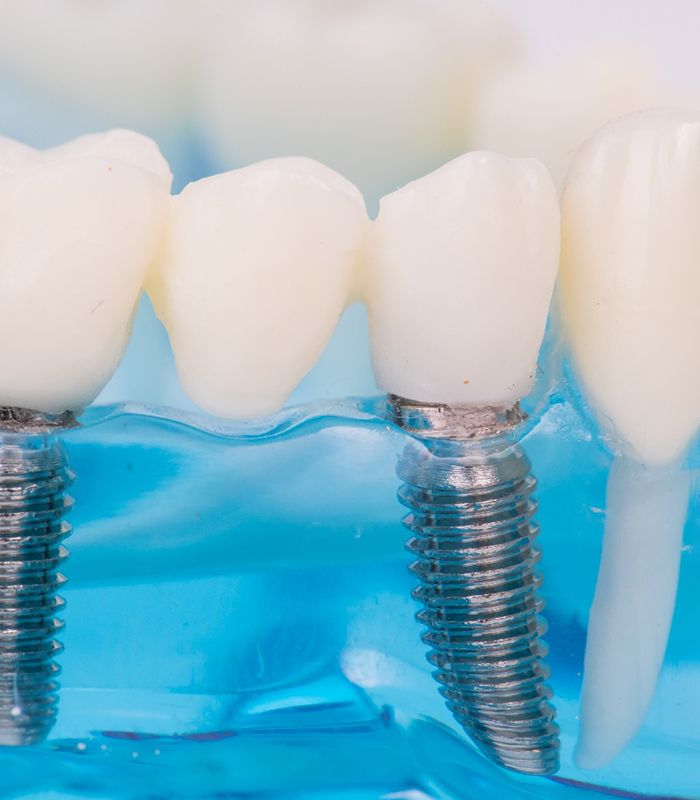
Thanks to advancements in dentistry, more patients than ever are able to fill the gaps in their grins with expertly placed dental implants. Even if you aren’t currently a candidate for dental implant surgery, you might be able to have the process done after certain preparatory procedures have been completed. Below are some examples of advanced treatments that might be necessary to ensure your dental implants can last for the rest of your life.
Bone Grafting
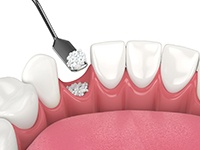
One of the most common obstacles to dental implant placement is the fact that missing teeth can directly lead to bone loss in your jaw. Whenever you bite or chew, your teeth stimulate the jawbone to help maintain it. But if teeth are missing, the lack of stimulation will make your body think the bone in that area is no longer needed and start to resorb it. If too much bone is resorbed, your jaw will be weakened and may not be able to support implant posts.
Fortunately, bone loss in your jaw can often be corrected with bone grafting. For this procedure, your gums are opened so that grafting material can be applied to the weakened areas. (The material is usually bone tissue taken from another part of your body.) The procedure will encourage your jaw to create new bone tissue, thus repairing any existing damage. After the healing process – which usually takes around three to nine months – your jaw will be ready for dental implant surgery.
Ridge Expansion
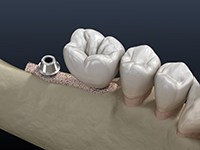
The ridge bone is the part of the jaw that surrounds and supports the teeth. When teeth are lost, the ridge bone will start to deteriorate. In some cases, the bone loss occurs horizontally; as a result, the jaw will be too narrow for dental implants to be placed. As such, in order to move forward with the implant process, we will need to create the necessary room via a ridge expansion.
We begin by numbing your mouth and opening your gums. Once we’re able to access your ridge bone, it is carefully divided into inner and outer segments. These two segments are then separated to create space that can be filled with grafting material. Just like with a traditional bone graft, the material used for ridge expansion will likely be bone tissue taken from elsewhere in your body, although it can also come from a donor.
The recovery process after a ridge expansion can be as short as a few weeks, but in other cases, it might be as long as four months; the exact amount of time varies from patient to patient based on factors such as the complexity of the procedure. After you’ve recovered, we can reexamine your jaw to confirm whether dental implants can now be placed.
Guided Dental Implant Surgery

Dental implant placement surgery can be performed one of two ways—freehand or guided. While the freehand method works for simpler cases involving one or two implants, for patients who require more, guided is the way to go. It involves using our CT scanner to create a guide that goes into a patient’s mouth during the procedure, guaranteeing each implant is placed at the perfect height and angle to ensure long-term success.
Learn More About Guided Dental Implant Surgery
Maintaining & Caring for Your Dental Implants

After investing so much time and financial resources into restoring your smile with cutting-edge dental implants, it’s important that you get the most out of them. With routine maintenance and dental implant care in Jonesboro, you could enjoy your new replacement teeth for 35 years or longer, meaning fewer visits to your dentist to get them replaced! Below, we’ve included some helpful care tips to get the most out of your rejuvenated smile.
Prioritize Your Oral Hygiene
Just like with your natural teeth, maintaining good at-home oral hygiene is crucial to the health of your dental implants. One of the top causes of dental implant failure is peri-implantitis, which is an infection of the soft tissue supporting your implants, potentially causing them to become loose or preventing them from fusing with the bone. The best way to keep this condition from developing is to brush twice a day, floss daily, and rinse with antimicrobial mouthwash to keep bacteria from accumulating and leading to infection.
Maintain a Balanced Diet
Oral bacteria love to feast on carbohydrates and sugars that linger in the mouth, which is why minimizing your intake of processed foods and maintaining a balanced diet can be so beneficial for your oral health. Try substituting processed snacks for fresh fruits and vegetables to help minimize plaque accumulation and prevent the build-up of carbohydrates and sugars within the mouth.
Break Bad Oral Habits
Whether you chew on your pencils, use tobacco products, or drink excessive amounts of alcohol, all of these habits can have a negative impact on your dental implants in Jonesboro. When you take small steps towards stopping these habits and substituting them with healthier coping mechanisms, you can not only improve the lifespan of your newfound smile, but you can also improve your overall wellbeing.
Protect Your Dental Implants
If you play sports or grind your teeth, it’s crucial to wear protection to keep trauma and force from wearing down your new replacement teeth, eventually causing your implants to become loose. Ask your dentist in Jonesboro about protective oral appliances that can cushion your jaw and teeth to prevent damage due to an accident or bruxism.
Schedule Regular Dental Checkups & Cleanings
The American Dental Association recommends visiting your dentist once every six months for a professional checkup and cleaning to maintain the health of your teeth and gums, and the same rule goes for keeping your dental implants in good health. During these visits, Dr. Smith will have a chance to examine your prosthetics and implants to ensure that if any issues do arise, they’re addressed as soon as possible, before they have a chance to compromise your new smile.
Dental Implant Failure & Salvage
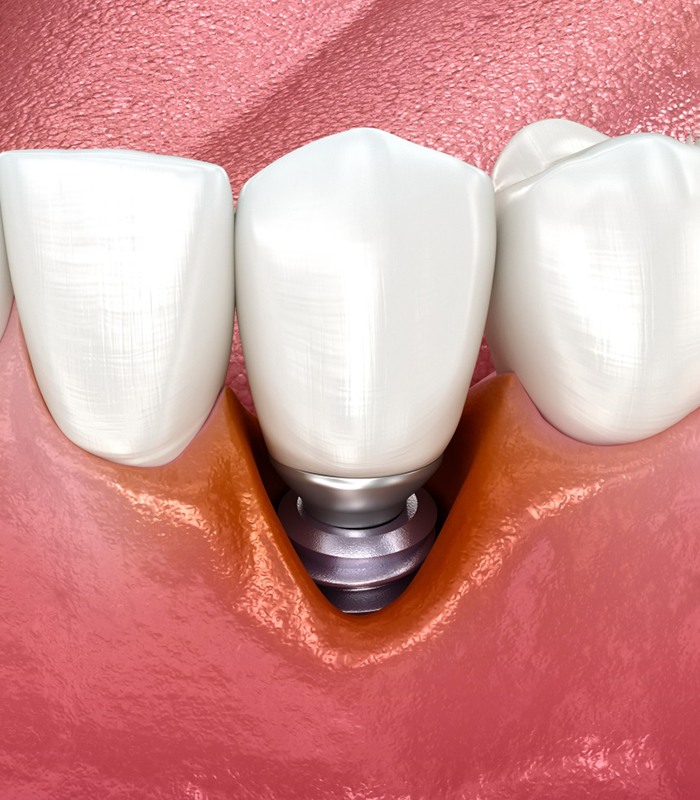
Dental implants are consistently successful. In fact, they thrive in more than 95% of cases. However, there are rare instances when they fail, perhaps due to infection or physical trauma. If you ever suspect that something is amiss with your restored smile, get in touch our team right away. We will assess the situation and recommend your next steps. Our goal is to get your oral health and your dental function back on track as quickly and conservatively as possible.
Dental Implant Frequently Asked Questions
We understand if you have questions about dental implants—committing to any treatment that involves even minor surgery is a big deal! Fortunately, Dr. Shane Smith and our team are more than happy to share any information you need before making decisions about your oral care. Below, you’ll find answers to some of our most common dental implant-related questions.
Does getting dental implants hurt?
In short, no. The jaw does not have many nerve endings, and we numb the area before placing implants, so a patient ends up feeling practically nothing. A little swelling and tenderness are common afterward, but these can usually be easily managed with OTC medication.
How long will it take for me to get dental implants?
The answer to this question depends on many factors, such as how many teeth are going to be replaced and the current state of a patient’s mouth. A single tooth can sometimes be completed in a matter of months, while an implant denture may take closer to a year if issues like gum disease need to be resolved ahead of surgery. Dr. Smith can give you a more concrete timeline at your initial appointment.
Will I be able to take my dental implants out?
No, dental implants are fixed just like your natural teeth, so you don’t have to worry about removing them for cleaning or maintenance. Some types of implant dentures are removable, but the posts themselves will stay put.
Will I have to miss work to get dental implants?
We recommend that most patients take the day off of their placement surgery and maybe the day after, but they are usually able to resume their normal daily activities fairly quickly. You may need to take more time off if your job is physically demanding, as this may interrupt the clotting and healing process.
Can I get dental implants if I’m diabetic?
Yes, as long as you have your diabetes under control. Properly managed diabetes has little to no effect on the success of implant surgery. If you need help with your diabetes, our team can work with your primary doctor to ensure you’re ready for surgery.